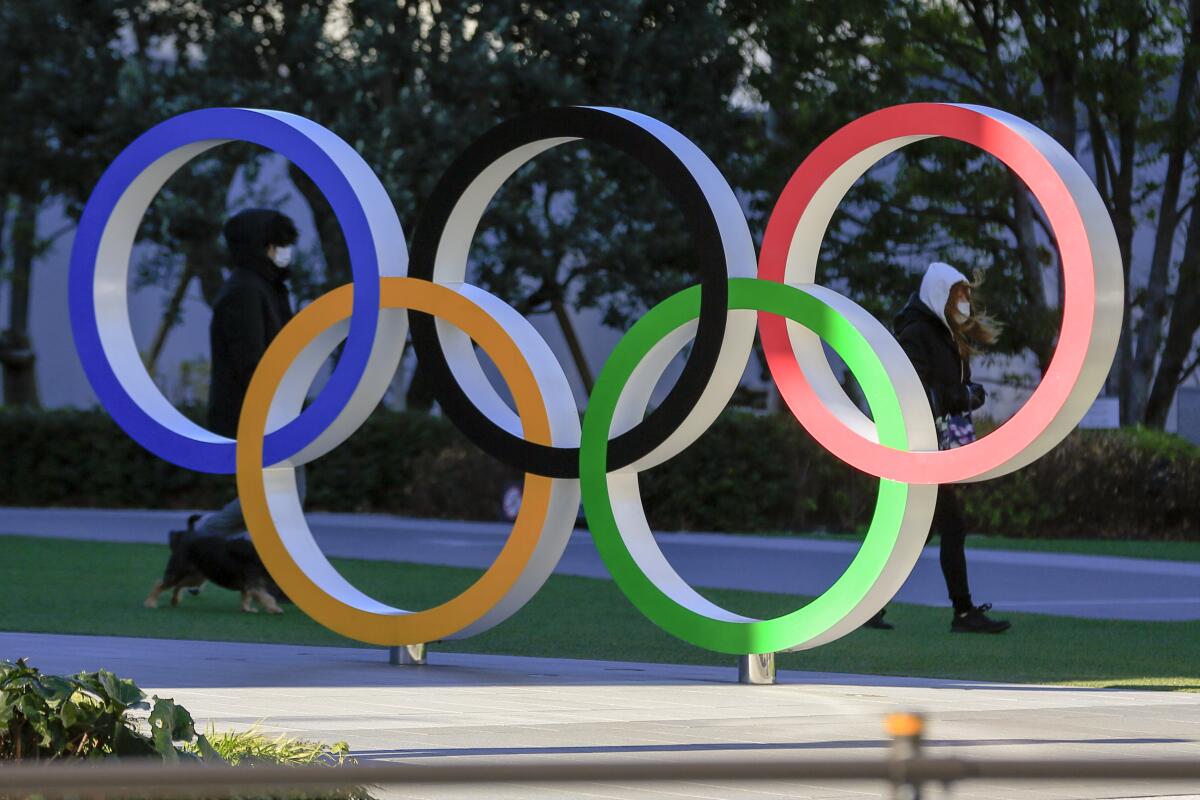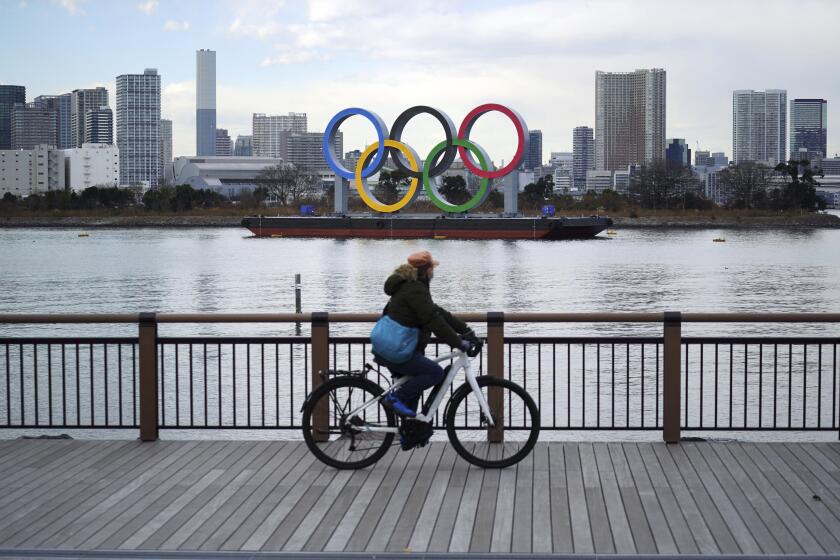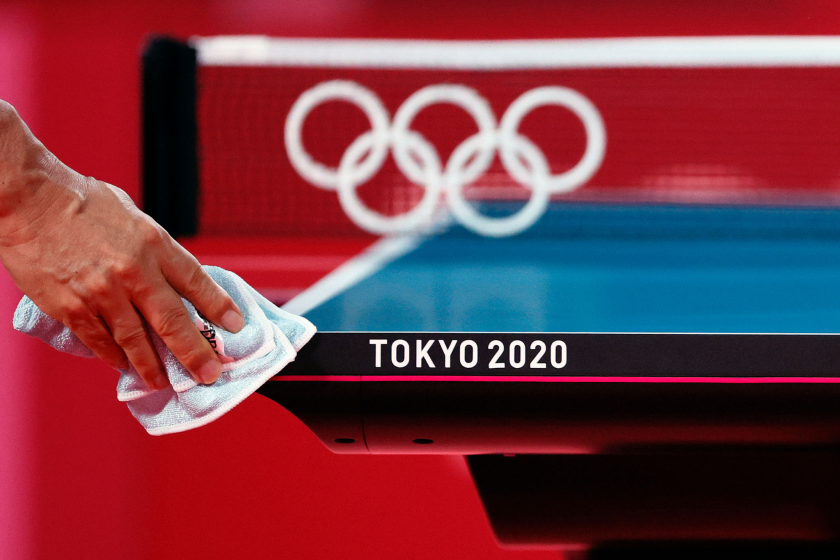Op-Ed: Tokyo’s Olympics have turned nightmarish. L.A., are you watching?

In May, as public opinion against the Tokyo Olympics surged along with COVID-19 cases in Japan, International Olympic Committee spokesperson Mark Adams uttered what could be the nine most terrifying words in the Olympic lexicon: “We listen but won’t be guided by public opinion.”
No kidding. Japan’s top medical advisor Shigeru Omi declared it was “not normal” to stage the Games during a pandemic. Dr. Annie Sparrow, a public health specialist, said of the IOC, “There’s been an ignorance of science.” Toyota, which reportedly paid $1 billion to sponsor the Games over eight years, pulled its Olympic-themed commercials from local airwaves because of the event’s polarizing effect in the host country.
But the Games will go on.
The Tokyo Olympics, with opening ceremonies scheduled for 4 a.m. Pacific time Friday, may seem like a distant event carried out under unprecedented conditions that have little to do with Los Angeles. But the saga of these Games offers key lessons that Angelenos must confront. The Tokyo debacle has exposed an International Olympic Committee that disrespects the will of locals, brushes off inconvenient concerns of experts and prioritizes its profits over all else. The Olympics kneecap democracy, and the Games are extraordinarily vulnerable to catastrophe.
The Olympics come with a Jekyll and Hyde effect: The IOC’s warm embrace of host cities during the bid stage can turn into a vise grip. Back in 2013, the IOC trumpeted Tokyo as “a safe pair of hands” for the Games, but the committee steamrolled the locals at will. In 2019, for example, citing summer heat, the IOC relocated the marathon from Tokyo 500 miles north to Sapporo, angering Tokyo’s governor because, she said, the host city was not consulted.
And that was before the pandemic.
Amid the recent public clamoring to further postpone or just plain cancel the Games, the IOC’s tyranny over its hosts in Tokyo has been abundantly evident. Japanese Prime Minister Yoshihide Suga admitted he was powerless, despite his nation’s desires. “The IOC has the authority to decide,” he said, “and the IOC has already decided to hold the Tokyo Olympics.”
Suga was right. The host city contract Tokyo signed — and the one L.A. signed to host the 2028 Games — states that only the IOC can cancel the Games. In Japan, the contract’s tremendous powers included an ability to transmogrify the elected leader of a sovereign state into a mere supplicant.
Some inside the Olympic circle are waking up to this lopsided reality. When Olympic sprinter Allyson Felix — who will compete in her fifth Olympics in Tokyo — helped her hometown of L.A. land the Games for a third time, it was an eye-opening experience.
“Seeing more of how the International Olympic Committee operates, it’s not what I thought it was,” Felix told the New York Times. “The athletes are a very minimal part. The athletes do not have a seat at the table when the decisions are being made. Now I get where we fall in the grand scheme of this ginormous thing that makes a ton of money — the athletes don’t see that money. It’s a big machine.”
The “big machine” is an expensive one, too. Tokyo costs have skyrocketed, from $7.3 billion to around $30 billion by some calculations. Los Angeles Olympic boosters have boasted that the 2028 Games will be privately funded, and that the costs are under control. And yet cost estimates have already escalated from $5.3 billion during the bid process to $6.9 billion today. And this doesn’t include billions in security costs that will largely be covered by the federal government — which is to say, taxpayers across the U.S.
For NBCUniversal, televising the Olympic Games is a marquee moment for its TV networks and a huge money-making event.
Potentially there’s more bad news for taxpayers. In 2019, Mayor Eric Garcetti projected a profit of $1 billion for L.A. from the 2028 Games, but he produced zero specific evidence to back it up. Olympic true believers are already betting beer that Garcetti’s $1 billion will come to pass. But the city and state are the real gamblers: They are on the hook for cost overruns.
Tokyo underscores the Olympics’ conspicuous democracy deficit in other ways, too. Signatories to the Tokyo 2020 host-city contract are no longer in office today. Likewise, Garcetti and then-City Council member and president Herb Wesson, whose names grace L.A.’s host-city agreement, will be long gone from those offices in 2028. Plus, neither Tokyo nor Los Angeles afforded its residents the opportunity to vote on whether they were keen to host.
That there are downsides to hosting the Olympics is no surprise. Consider the displacement of 77,000 people in Rio de Janeiro; the destruction of a sacred forest to make way for an Olympic ski run in Pyeongchang, South Korea; the herd of white-elephant stadiums that no one uses in Athens; the gentrification linked to the London 2012 Olympics where Newham, one of the five host boroughs for the Games, experienced the largest spike in home prices in all of London while simultaneously becoming the borough with the highest rate of homelessness.
But what we might call the traditional risks of hosting the Games pale in comparison to the way the IOC has muscled Japan around in the midst of the pandemic. Angelenos might consider what the committee would do to L.A.’s plans if the summer of 2028 is as hot, dry and fire prone as the summer of 2021.
The IOC’s decision to hold the Tokyo Olympics amid an ongoing pandemic in Japan has presented a plethora challenges — and positive tests for athletes before the Games have even begun.
Television broadcasters paid billions to the IOC to air the Games — since 2011, NBC alone has paid more than $12 billion to screen the Olympics through 2032. It generated $1.6 billion just from the 2016 Rio Olympics. Seventy-three percent of the IOC’s revenue comes from broadcaster fees. NBC, for its part, expects Tokyo to be its most profitable Games ever.
As for the return on investment Tokyo hoped to see as host to athletes, spectators and marketers from around the world — it’s mostly gone with the pandemic.
Let the 2020 Games be a warning for L.A. In Japan, the gold will go to the five-ring powerbrokers. Tokyo is the also ran.
Jules Boykoff, a political science professor at Pacific University, is the author of four books on the Olympics and a former professional soccer player who played for the U.S. Olympic team.
More to Read
A cure for the common opinion
Get thought-provoking perspectives with our weekly newsletter.
You may occasionally receive promotional content from the Los Angeles Times.












